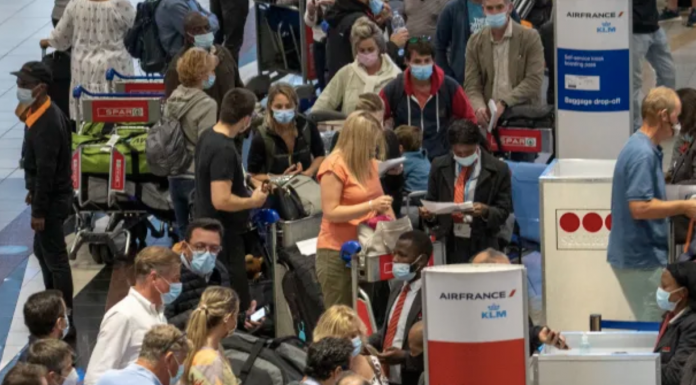THE HAGUE, Netherlands (AP) — With each passing hour, new restrictions were being slapped on travel from countries in southern Africa as the world scurried Saturday to contain a new variant of the coronavirus that has the potential to be more resistant to the protection offered by vaccines.
A host of countries, including Australia, Brazil, Canada Iran, Japan, Thailand and the United States, joined others, including the European Union and the U.K. in impose restrictions on southern African countries in response to warnings over the transmissibility of the new variant — against the advice of the World Health Organization.
Despite the shutdown of flights, there was increasing evidence that the variant is already spreading. Cases have been reported in travelers in Belgium, Israel and Hong Kong, and Germany also has a probable case. Dutch authorities are checking for the new variant after 61 passengers on two flights from South Africa tested positive for COVID-19.
The global health body has named the new variant omicron, labeling it a variant of concern because of its high number of mutations and some early evidence that it carries a higher degree of infection than other variants. That means people who contracted COVID-19 and recovered could be subject to catching it again. It could take weeks to know if current vaccines are less effective against it.
With so much uncertainty about the omicron variant and scientists unlikely to flesh out their findings for a few weeks, countries around the world have been taking a safety-first approach, in the knowledge that previous outbreaks of the pandemic have been partly fueled by lax border policies.
“It seems to spread rapidly,” U.S. President Joe Biden said Friday of the new variant, only a day after celebrating the resumption of Thanksgiving gatherings for millions of American families and the sense that normal life was coming back at least for the vaccinated. In announcing new travel restrictions, he told reporters, “I’ve decided that we’re going to be cautious.”
Nearly two years on since the start of the pandemic that has claimed more than 5 million lives around the world, countries are on high alert.
Dutch authorities have isolated 61 people who tested positive for COVID-19 on arrival in the Netherlands on two flights from South Africa on Friday. They are carrying out further investigations to see if any of the travelers have the omicron variant.
The planes arrived in the Netherlands from Johannesburg and Cape Town shortly after the Dutch government imposed a ban on flights from southern African nations.
The 539 travelers who tested negative were allowed to return home or continue their journeys to other countries. Under government regulations, those who live in the Netherlands and are allowed to return home must self-isolate for at least five days.
A German official also said Saturday that there’s a “very high probability” that the omicron variant has already arrived in the country.
Kai Klose, the health minister for Hesse state, which includes Frankfurt, said in a tweet that “several mutations typical of omicron” were found Friday night in a traveler returning from South Africa, who was isolated at home. Sequencing of the test had yet to be completed.
The variant’s swift spread among young people in South Africa has alarmed health professionals even though there was no immediate indication whether the variant causes more severe disease. In just two weeks, omicron has turned a period of low transmission in the country into one of rapid growth.
A number of pharmaceutical firms, including AstraZeneca, Moderna, Novavax and Pfizer, said they have plans in place to adapt their vaccines in light of the emergence of omicron.
Professor Andrew Pollard, the director of the Oxford Vaccine Group which developed the AstraZeneca vaccine, expressed cautious optimism that existing vaccines could be effective at preventing serious disease from the omicron variant.
He said most of the mutations appear to be in similar regions as those in other variants.
“That tells you that despite those mutations existing in other variants the vaccines have continued to prevent serious disease as we’ve moved through alpha, beta, gamma and delta,” he told BBC radio. “At least from a speculative point of view we have some optimism that the vaccine should still work against a new variant for serious disease but really we need to wait several weeks to have that confirmed.”
He added that it is “extremely unlikely that a reboot of a pandemic in a vaccinated population like we saw last year is going to happen.”
Some experts said the variant’s emergence illustrated how rich countries’ hoarding of vaccines threatens to prolong the pandemic.
Fewer than 6% of people in Africa have been fully immunized against COVID-19, and millions of health workers and vulnerable populations have yet to receive a single dose.
Those conditions can speed up spread of the virus, offering more opportunities for it to evolve into a dangerous variant.
___
Pylas contributed from London. Geir Moulson in Berlin contributed to this report.



